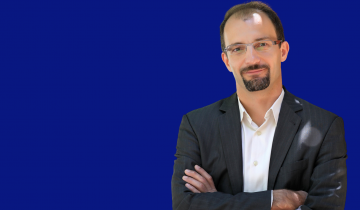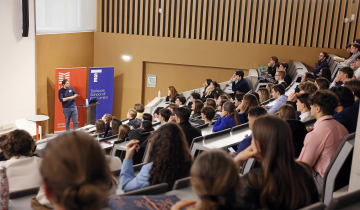Nina HESTERMANN soutiendra sa thèse de doctorat en sciences économiques "Essays on Subjective Expectations" Mardi 27 mars 2018, 15h00 Salle MQ 212 (Manufacture des Tabacs).
Le jury sera composé de :
- Monsieur Alan SULE, Professeur, Université d’ESSEX
- Monsieur Joêl VAN der WEELE, Professeur, Université d’Amsterdam
- Monsieur Anton SUVOROV, Professeur Higher School of Economics
- Monsieur Nicolas TREICH, Professeur, TSE
Résumé (en anglais)
Economists are interested in the way individuals take decisions, such as when making consumption or investment choices. When seeking to under- stand the process of decision-making, it is essential to understand how information relevant to the decision at hand is acquired and processed. Correctly integrating signals received allows agents to update their beliefs and act accordingly. My work looks at individuals’ attitudes towards information from different angles, namely: the integration of feedback students receive on their skills when making university enrolment choices, the updating of beliefs about themselves and about the quality of their environment of individuals who are overconfident about their skills as opposed to more realistic individuals, and finally, the willingness to integrate morally salient information when forming beliefs and take consumption decisions accordingly. These three aspects correspond to the different projects that comprise the dissertation.
A first empirical paper focusses on information relevant to human capital investment decisions with regard to tertiary education. In joint work with Nicolas Pistolesi, we investigate the impact of a French educational policy reform aimed at improving the match between students and their chosen field of study at university. As part of this reform, upon applying for entry to an undergraduate degree course, universities inform students about their likelihood of succeeding in their chosen field of study, based on their grades in high school and other indicators of their academic skills. To examine the effect of the feedback they receive on students’ choices, we compare students applying to different departments within the same university, some of which implement the policy, providing candidates with feedback, whereas others do not. The feedback received depends on students grades during their final years of high school, and being able to access information for the different departments, those offering feedback versus those which don’t, allows us to compare students who are similar in all observed characteristics, but only differ by the fact that when making their choices they have received some additional information or not. We
find that among those receiving a negative feedback, the proportion of students who decide to enroll for the degree course in question is reduced by about 12 percentage points. This policy thus seems indeed to be effective in discouraging students from enrolling who are deemed academically unprepared for the field of study they envisaged to embark on.
A second project takes a more general approach to agents’ capacity to correctly process information about their own skills. In joint work with Yves Le Yaouanq we develop a theoretical model that describes the integration of information both about themselves and about their environment of agents who are initially overconfident about their own skills versus that of more realistic agents. The model studies the dynamic experimentation problem of agents in a situation where the outcomes depend on two uncertain variables: the individuals intrinsic ability and an external variable which is imperfectly known. Agents repeatedly carry out a task and succeeding or failing provides them with information about both of these variables. We analyze the mistakes in inferences and experimentation decisions made by decision- makers who hold inaccurate prior beliefs about their ability. We show that overconfident individuals overestimate the importance of intrinsic ability relative to external factors if they succeed, and underestimate it if they fail. The long-run welfare effects of initial miscalibrations in self-confidence are asymmetric: overconfident individuals are too easily dissatisfied with their environment, which endogenously leads them to experiment too much and to revise their self-confidence downwards over time; in contrast, underconfident decision-makers might be trapped in lowquality environments and incur utility losses forever. Our findings thus extend a literature on the implications of overconfidence on decision-making and welfare, which primarily focusses on the benefits and costs of overconfidence that are linked to biased beliefs about individuals’ own ability. Benefits are derived from improvements in personal motivation and from the possibility to thus offset certain other behavioral biases, such as a tendency to procrastinate.
Costs are incurred when decision-making is impaired due to overconfidence, such as when picking tasks that are beyond the agent’s capacity and thus investing time and energy in vain. Our project shows that additional facets of the decision-making problem are revealed when learning occurs both about the agent’s own ability and about the quality of the environment. Such a setting is ubiquitous in everyday life, and relevant examples are abundant. We discuss the implications of our model for the attribution of guilt and merit in teams, human capital investment, the choice of romantic partners, quitting an addictive behavior, such as smoking, and the formation of preferences over redistributive policies.
Finally, in joint work with my advisor Nicolas Treich and with Yves Le Yaouanq, we analyze the relationship between consumers’ attitudes towards animal welfare and their consumption of animal food products. This project is comprised of both a theoretical and an empirical section. In a survey we document a systematic and strong correlation between individuals’ perceptions of animal suffering in conventional farming and their consumption habits regarding meat products. In line with the literature on the meat paradox, and with recent experimental evidence on belief distortion in social dilemna, we propose a model of motivated belief formation where individuals understate the negative consequences of their actions on animals in order to alleviate the guilt caused by their consumption. Agents have the choice to acquire and integrate, or else to discard, information that is relevant to their consumption decision, such as media coverage of the cruelty implied by intensive farming practices. When choosing whether to keep or discard the information, individuals take into account how it’s acquisition would affect their welfare in the following period. Acquiring information about the suffering of animals will imply incurring a cost of guilt when consuming meat subsequently, and the willingness to keep information thus depends on the agent’s consumption habits. Other parameters that affect her choice are the price of meat: if meat is more expensive, this may lead to a higher willingness to integrate information, as less meat is consumed and thus the cost of guilt reduced. We also show how other people’s consumption decisions affect the agent’s attitude towards information when her utility depends not only on her own consumption, but also on the total amount of suffering inflicted on livestock due to a society’s consumption habits, and the conditions under which multiple equilibria exist where societies will either choose high realism and low consumption, or the inverse.



